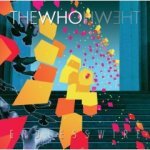
The Who Endless Wire
(Polydor, Ltd)
Let me get one thing out of the way right up front. Say what you will about whether this is a "real" Who album without John Entwistle, not to mention Keith Moon, the fact remains that it is the first recording carrying that moniker that I can listen to all the way through since Quadrophenia. Got that?
Sorry, listening to these guys gets my back up. How do we come to a project like this, the first in 24 years, without expectations and baggage? Is it possible to retain subjectivity, a set of new ears, on something so burdened with history? I'm not sure. It's hard for me to avoid the fact that hearing Roger Daltrey sing this set of Pete Townshend songs (the last set he sang on Pete's Iron Man didn't quite cut it) invokes in me a feeling of profound yearning for my teenage years first discovering the band. Not that this sounds like the old Who; not exactly. But the key ingredients that fired their best work from day one are present, in abundance. What always set them apart was Townshend's sense of indignation and alienation, and his tendency to lash out rather than shrink from it, coupled with Daltrey's keen ability to channel this ferocity. This is the quality that spoke to disenchanted youth from the stammer of My Generation to that question borne of fear and cockiness, 'Who the fuck are you?". The other crucial element was the feeling that the solution to being disenfranchised was to seek protection and strength from a community, whether it was the mods cruising the beaches of Brighton or the legions united behind the deaf, dumb and blind boy.
Two songs in, on A Man in a Purple Dress, we find both ingredients. Here is Daltrey, staunchly defending his friend, proclaiming Townshend's condemnation of his accusers in the child porn case that almost ruined his life and career, as if to say "A cross dresser for the State accusing me of sexual deviancy? I don't think so." This comradery is expressed most explicitly in You Stand by Me, where Townshend himself thanks his partner who "takes my side, against those who lie". When you hear aging hippies, the smart ones anyway, complain about the current state of music in comparison to what they grew up on, this is what they are talking about. It's the sense that we're all in this together that's missing. This, and the unifying power of music, seems to be what the closing mini-opera is about. With Pete it's always a little hard to tell. The final statement is unambiguous however, as Tea and Theatre is once again an homage to his band, the fallen and the only two left standing. It's a tribute to the group as an entity and the music they made, pure and easy. I find this unironic sentiment intensely refreshing.
Now and again, Endless Wire can sound as aimless as any Townshend solo album, but Daltrey manages to keep it grounded. His unpretentious, confrontational presence is crucial, and makes this a true Who album. Sure, there are echoes of the old band sound. Mike Post Theme in particular has the crashing drums and guitars of peak era Who and whom among us can resist declarations like "if there really is a God, we should get laid today!"? This is the album's centerpiece, and its claim that "emotionally we're not even old enough" makes a nice bookend to "hope I die before I get old". Elsewhere, the swirling keyboards, intro drum fill and unmistakable guitar patterns of Fragments will have you dusting off the old bong. Two Thousand Years recalls the folksy diversions of Tommy Can You Hear Me? and I've Had Enough.
But Endless Wire isn't merely an exercise in nostalgia. It proves that these guys can still produce something meaningful and urgent. Maybe after the abyss so many great artists entered in the late 70s and 80's they are finally able to stare their legend in the face and accept it, unintimidated. It's not perfect, but it's a beautiful thing.
1 December, 2006 - 18:40 — Alan Shulman